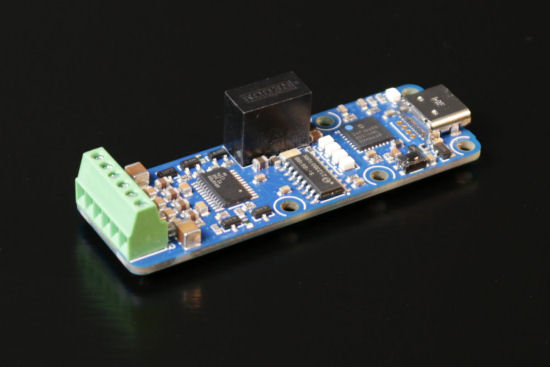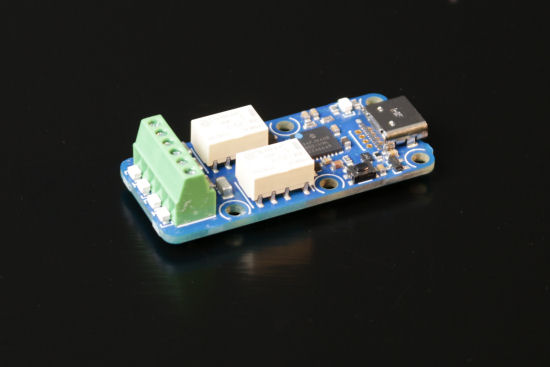![]() This week, Yoctopuce announces two new modules with USB-C connectivity, namely the Yocto-IO-V2-C and the Yocto-Relay-C, two handy little actuators when it comes to manipulating low-power electrical signals in a compact footprint.
This week, Yoctopuce announces two new modules with USB-C connectivity, namely the Yocto-IO-V2-C and the Yocto-Relay-C, two handy little actuators when it comes to manipulating low-power electrical signals in a compact footprint.
Yocto-IO-V2-C
The Yocto-IO-V2-C is a module for interfacing electrical signals, providing four isolated inputs and outputs. Each channel is independent and can be configured as an input or output for normal or open-drain operation.
The channels are electrically isolated from the USB bus, but not from each other: they share the same ground. The Yocto-IO-V2-C can handle 3 or 5V signals using the USB bus power supply. But if you add an external power supply, you can go up to 28V.

The Yocto-IO-V2-C
As the micro-B version of the Yocto-IO-V2 is a very recent product, it comes as no surprise that the USB-C version is available at a similar price: CHF 60.20.
The Yocto-Relay-C
The Yocto-Relay-C is the USB-C version of the Yocto-Relay, one of the first modules Yoctopuce brought to market in 2011. It's a module with two small SPDT relays. You can use it to switch signals up to 60 volts. Like all Yoctopuce relays, it provides small, simple automations that could well simplify the programming of your projects.

The Yocto-Relay-C
The bad news is that, at CHF 40.75, the Yocto-Relay-C is almost 9 francs more expensive than the Yocto-Relay. The explanation is simple: it's not really the Yocto-Relay-C that's more expensive, it's Yocto-Relay that's underpriced.
As a reminder, the price of a Yoctopuce module is calculated as three times the cost of its component parts. Once determined, the price in Swiss Francs is not changed, except in exceptional cases. The Yocto-Relay went on sale for 31.90 in 2011. But in the meantime, the TE Connectivity relays present on the first models have been replaced by OMRON relays, which are better but more expensive. Components to protect relays from potential power surges have been added. These improvements increased the cost of manufacturing the module without us adjusting the price accordingly, resulting in a significant difference 14 years later.
To conclude
The migration of Yoctopuce modules to USB-C connectivity continues, with both good and bad surprises. The next modules to go through the mill will probably be the Yocto-PowerRelay-V2 and the Yocto-PT100.


